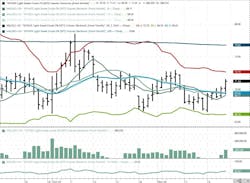Oil, fundamental analysis
Crude oil prices rallied successively higher this week as the Russia/Ukraine war increased in intensity and a risk premium was once again added to the market.
WTI saw a High/Low range of $71.50/bb/ (Friday)/$66.60/bbl (Monday) while Brent crude, which traded in a similar pattern saw $75.40/$70.70. The small gain in inventory and a large increase in gasoline stocks weren’t enough to offset the geopolitical concerns.
Additionally, US equity markets also provided an optimistic outlook for future energy demand However, a US Dollar trading at a 12-month high kept a lid on the rally. Both grades of crude settled higher week-on-week. The Brent/WTI has widened to -$3.95/bbl.
For crude markets, the geopolitical focus this week shifted from the Middle East to the Russia/Ukraine conflict, causing concerns over supply disruption again. With the approval for Ukraine to use US-supplied long-range weapons to attack military installations inside Russia, Vladimir Putin loosened his criteria for the use of nuclear arms to include countries which supply such aid. This only served to heighten the stakes in this on-going conflict. Additionally, Russia has launched intercontinental ballistic missiles into Ukraine in a retaliatory move. It’s the first use of a missile of this range so far in this war.
Tanker monitors have indicated that Russian oil exports have dropped to a 2-month low of 3.3 million b/d as of mid-November, but the decrease is unrelated to the conflict.
OPEC will meet again on Dec. 1 and the expectation is that the cartel will not increase output in the near future given the prospects of a surplus next year.
US West Coast refiners are actually receiving about 50% of the exported volumes from Canada’s Trans Mountain crude pipeline. There were concerns that most, if not all, of the bitumen shipped would be bound for Asian markets.
The Energy Information Administration’s Weekly Petroleum Status Report indicated that commercial crude oil inventories for last week increased slightly while gasoline stocks saw a large gain. The SPR gained +1.4 million bbl to 389 million bbl. Total US oil production fell 200,000 b/d back to 13.2 million b/d vs. 13.2 last year at this time. The US rig count fell by 1 last week to 479 vs. 522 a year-ago.
US existing home sales rose last month 4.3% over September and were 2.9% vs. year-ago. All three major US stock indices were higher week over week. The USD hit a 12-month high this week which tends to be bearish for crude prices.
Oil, technical analysis
December 2024 NYMEX WTI futures expired this week with January 2025 now the prompt month. Prices moved above the 8-, 13-, and 21-day Moving Averages by week’s end. Volume is rising at over 380,000. The Relative Strength Indicator (RSI), a momentum indicator, is neutral at the 54 mark. 30 or below is considered very oversold while 70 or above is considered very overbought. Resistance is now pegged at $71.60 with near-term Support is $69.45.
Looking ahead
The change in weapons now being used in the Russia/Ukraine war represents a major escalation in tactics. And, while there has yet to be a disruption of oil flows out of the region, it would only take one missile from Ukraine to hit a key oil-related target for this to happen. So, the geopolitical risk in crude markets will remain unless there is a de-escalation.
Meanwhile, the Middle East conflict still presents oil traders with supply concerns. Weather for the first week of December looks favorable for heating oil demand as the entire Northeast is forecasted to have below-normal temperatures.
Natural gas, fundamental analysis
Frenzied buying for December 2024 NYMEX futures contracts ensued this week as the first strong cold front hit portions of the US while the EIA reported the first withdrawal from storage of the heating season. The week’s High was $3.565/MMbtu on Friday in what turned out to be an over-reaction to the cold weather while the Low was Monday’s $2.83.
Supply last week was +0.8 bcfd to 108.4 bcfd vs. 107.6 the prior week. Demand was 107.9 bcfd, up from 107.3 the week prior with increases in Residential usage. Exports to Mexico were 5.8 bcfd vs. 6.1 the prior week. LNG exports were 14.2 bcfd. vs. 14.1 the prior week. The European natural gas prices were quoted at $11.70/MMbtu.
The EIA’s Weekly Natural Gas Storage Report indicated the first withdrawal of the winter season of -3 bcf vs. a forecast of +7 bcf vs. a 5-year average of -16 bcf. Total gas in storage is now 3.969 tcf, lowering to +3.7% above last year and rising to 6.4% over the 5-year average.
Natural gas, technical analysis
December 2024 NYMEX Henry Hub Natural Gas futures are above the 8-, 13- and 21-day Moving Averages and have breached the Upper-Bollinger Band limit, a Sell signal. Volume is lower than average at 90k. The RSI is slightly-overbought at 60. Support is pegged at $3.00 with Resistance at $3.33.
Looking ahead
With the first withdrawal of the heating season, and the large cold front moving across the country, look for another draw to be reported next week. One of the three trains at the beleaguered Freeport LNG export plant tripped representing about 0.7 bcfd of reduced output. As with heating oil, the first week of December looks very bullish for natural gas demand.
About the Author

Tom Seng
Dr. Tom Seng is an Assistant Professor of Professional Practice in Energy at the Ralph Lowe Energy Institute, Neeley School of Business, Texas Christian University, in Fort Worth, Tex.


